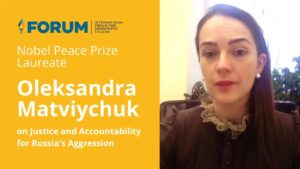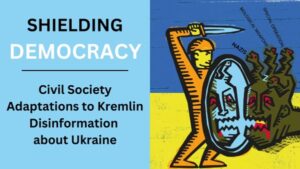Eleven months ago, President Joe Biden came to Poland to denounce a war he’d hoped to avoid. On Tuesday, he returned having fully embraced the mantle of wartime leader, boasting of a U.S.-led Western response that blunted Vladimir Putin’s invasion and slowed the march of global authoritarianism, POLITICO reports.
“NATO is more united and more unified than ever before,” Biden said. “The democracies of the world have grown stronger, not weaker. The autocrats of the world have grown weaker, not stronger.”
 “The stakes are eternal,” Biden added. “The choice between chaos and stability, between building and destroying, between hope and fear, between democracy that lifts up the human spirit and the brutal hand of the dictator that crushes it.”
“The stakes are eternal,” Biden added. “The choice between chaos and stability, between building and destroying, between hope and fear, between democracy that lifts up the human spirit and the brutal hand of the dictator that crushes it.”
Agile democracy
It will remain difficult for Russia to change — simply because it can’t, argues retired Lt. Gen. Mark Hertling. A nation’s army is drawn from its people, and a nation’s army reflects the character and values of the society.
While equipment, doctrine, training and leadership are important qualities of any army, the essence of a fighting force comes from what the nation represents, he writes for The Washington Post. Putin’s autocratic kleptocracy is thus far proving no match for Ukraine’s agile democracy.
Creative ambiguity
But is the West avoiding the Big Question, asks Matthew Kaminski, editor in chief of POLITICO. What outcome does the West want for Ukraine and, for that matter, Russia? We know how Ukrainians would wish this to end. Same goes for Putin, who can’t let them win. It’s the West that sometimes looks lost in the fog of war, lacking a vision for what victory looks like. Look closer and divisions in the alliance become clearer, he writes:
The North Americans, British, Poles and Balts are pushing hardest for Ukraine. These countries — most of which are members of NATO but not the EU — account for the bulk of the arms and economic aid sent to Ukraine. It’s the old Atlantic bloc, plus the “new Europeans.” The Continental powers (Germany, France, Italy) are less generous and more circumspect. As a share of its GDP, Germany gives roughly half what America has and a quarter of what Poland has last year in military aid to Ukraine. Hence the creative ambiguity in the alliance about where this is going.
 U.S. Under Secretary of State Victoria Nuland (right) has recently identified herself with the Ukrainian government position that Ukraine must regain all its territory and will not compromise on this, TIME reports. Nuland declared that, “[W]e will support Ukraine for as long as it takes. Ukraine is fighting for the return of all of its land within its international borders. We are supporting them, including in preparing a next hard push to regain their territory…Crimea must be—at a minimum, at a minimum—demilitarized.”
U.S. Under Secretary of State Victoria Nuland (right) has recently identified herself with the Ukrainian government position that Ukraine must regain all its territory and will not compromise on this, TIME reports. Nuland declared that, “[W]e will support Ukraine for as long as it takes. Ukraine is fighting for the return of all of its land within its international borders. We are supporting them, including in preparing a next hard push to regain their territory…Crimea must be—at a minimum, at a minimum—demilitarized.”
The war has highlighted how dangerous revisionist, authoritarian states can be, says Dr. Raymond Kuo, a political scientist at the RAND Corporation. Personalistic dictatorships like Putin’s regime are typically beset by poor information and groupthink, leading to volatile foreign policies and international conflict. If anything, Russia’s actions have undermined the appeal of this form of government, alongside Moscow’s global prestige and status, he tells The Diplomat.
 Poland’s emergence as a key player in helping shape the outcome of the war in Ukraine isn’t just about Warsaw’s deft negotiation game and pressure tactics, or its investment in hard power — it’s also about the unyielding logic of geopolitics, adds Chels Michta, a non-resident fellow at the Center for European Policy Analysis (CEPA). The Polish transportation hub near the town of Rzeszów has become a logistical gateway to Ukraine, without which the U.S. and its allies would be unable to supply and sustain the Ukrainian military or deliver economic and humanitarian assistance.
Poland’s emergence as a key player in helping shape the outcome of the war in Ukraine isn’t just about Warsaw’s deft negotiation game and pressure tactics, or its investment in hard power — it’s also about the unyielding logic of geopolitics, adds Chels Michta, a non-resident fellow at the Center for European Policy Analysis (CEPA). The Polish transportation hub near the town of Rzeszów has become a logistical gateway to Ukraine, without which the U.S. and its allies would be unable to supply and sustain the Ukrainian military or deliver economic and humanitarian assistance.
 This war is genocidal in nature. It’s about the possibility of our existence, notes Oleksandra Matviichuk, the head of Center for Civil Liberties in Kyiv, which shared the Nobel Peace Prize in 2022. If we stop fighting, there will be no more us. Therefore, we have no other choice but to resist the Russian occupation and destruction of Ukrainian identity, she writes for The Post.
This war is genocidal in nature. It’s about the possibility of our existence, notes Oleksandra Matviichuk, the head of Center for Civil Liberties in Kyiv, which shared the Nobel Peace Prize in 2022. If we stop fighting, there will be no more us. Therefore, we have no other choice but to resist the Russian occupation and destruction of Ukrainian identity, she writes for The Post.
Ukraine is fighting for freedom in all its senses: for the freedom to be an independent country, not a Russian colony, adds Matviichuk: for the freedom to have its own identity; for the freedom to have a democratic choice and to live in a society where the government does not determine what you believe, whom you love, what you say, where you go and what you die for.
 Moscow is using African resources to fund its war in Ukraine, says Damon Wilson, the CEO and President of the National Endowment for Democracy (NED). Authoritarian governments such as Putin’s are working tirelessly to challenge democracy worldwide, he tells VOA’s Carol Castiel (above).
Moscow is using African resources to fund its war in Ukraine, says Damon Wilson, the CEO and President of the National Endowment for Democracy (NED). Authoritarian governments such as Putin’s are working tirelessly to challenge democracy worldwide, he tells VOA’s Carol Castiel (above).
One year since the launch of the Kremlin’s unprovoked, full-scale invasion, Ukraine and its allies seem to be winning the battle in the information space, despite Moscow’s persistent and pervasive disinformation campaign, the International Forum for Democratic Studies adds.
Please join the Forum for the launch of its new report, Shielding Democracy: Civil Society Adaptations to Kremlin Disinformation about Ukraine. The conversation will share lessons learned from the coordinated effort to counter Moscow’s malign narratives, focusing on the critical role of civil society organizations in Ukraine and across Central and Eastern Europe. RSVP







